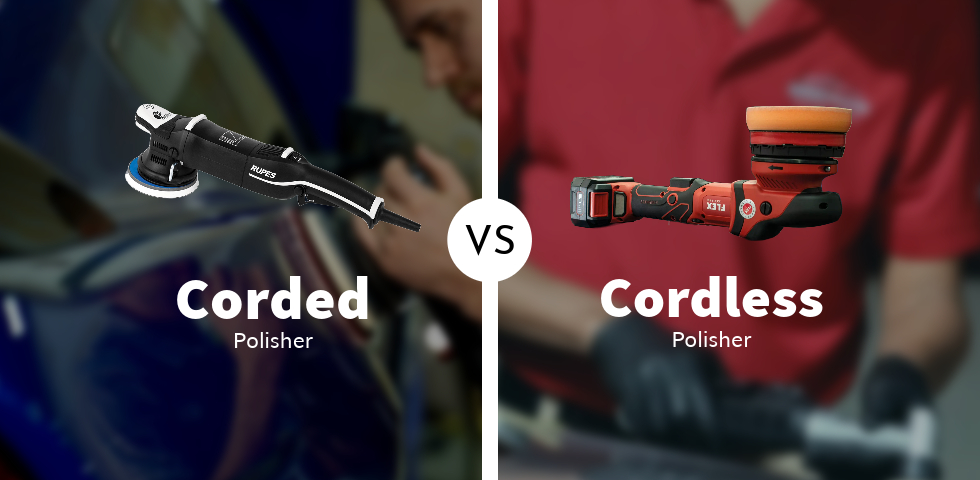When it comes to battery powered and cordless polishers there are a few pros and cons to both that I feel like people don’t really think about. Some people like the constant power that they get from corded polishers without the need for charging and some people like the mobility of battery powered polishers. In my opinion, its all a personal preference and there is room for both in any professional detailer’s arsenal. In this article, I want to take the time to talk about some of the pros and cons that come from working with either a corded or battery powered polisher.
Corded Polishers
Rupes created the first ever electric random orbital sander in 1968 called the Rupes BR8 and ever since, the technology has been improved tremendously. Image the vibration on an original Rupes polisher. I would probably have to put down the machine every 5 minutes. Since 1968, Rupes has been on the on the forefront of polishing and buffing technology creating backing plates and special polishing compounds for any step in your polishing process.
Pros
As stated above, the main pro of having a corded polisher would be the constant stream of power, since the unit is plugged into a power source and there isn’t a need for stopping to recharge the battery for your unit. On average, the batteries for cordless polishers only last a few hours forcing you to stop what you are doing, either replacing the battery or charging it. If you are replacing the battery that means you would need to have multiple batteries on hand. This brings me to my pro for corded polishers, they are plug and work. When it comes to power, all you need to do is plug it in and get polishing. Corded polishers are also a lot lighter due to not having a battery pack weighing the unit down.
Cons
Corded polishers have been the industry standard for a long time but they do come with a few cons compared to cordless polishers. The main con that comes to my mind is the lack of mobility. Since you are connected to a power source, you lose the free range of movement you would get when going cordless. You are pretty much at the will of your extension cord’s length. The extension cord could also get in the way while you are working, making it a chore to make sure that you are not tripping over it or trying to make sure that it doesn’t hit your vehicle.
Battery Powered Polisher
Battery powered polishers have started to become very popular recently due to them being more mobile, becoming smaller and battery technology becoming more reliable. All things considered, I personally believe these tools are great for any detailer to have in their arsenal! Like everything, battery powered units are not without their faults though.
Pros
Not having a cord proves to have its advantages especially when detailing a vehicle. With a battery powered polisher, there are no limitations on where you can use your polisher. You can use it indoors, outdoors, and away from electrical outlets which is great for mobile detailers. Another pro of a battery powered polisher that I think many people don’t think about is how much safer they are to use. The fact that you don’t have a to worry about tripping over a cord or it rubbing against your vehicle is a big deal to many.
Cons
I personally think battery powered polishers like the Rupes iBrid Mini HLR75 Polisher or the Griot’s Garage THE BOSS Hybrid Micro Polisher are esential to any profesional detailer’s arsenal due to the pros mentioned above. However, nothing is without its cons, and I would like to talk about those. The thing that makes these polishers so great is also a major con for many people, and that is the battery. You now have to worry about making sure the batteries for your unit are fully charged before you can start a detail. Sometimes taking 30 – 40 minutes to fully charge a battery. Depending on how long of a detail you are doing, you will also have to stop to let the battery charge. A way to circumvent this would be to purchase multiple batteries and make sure that they are all charged before you start the polishing process, which will cost you even more money. You will also not receive the same consistent power from a battery as you would from a unit that is plugged into an outlet. Another con that I would consider is the fact that a battery powered polisher is going to be heavier than a corded polisher. The weight difference isn’t astronomical but I think that is enough to talk about. To compare, the Flex XCE 8 125 18.0 Cordless Polisher comes in at about 6.4 lbs and the Rupes MarkIII 15MM is about 5.7 lbs.
In Conclusion
Both corded and battery powered polishers come with their respective pros and cons but in my opinion, you can’t go wrong with either. I believe that both are essential to a professional detailer’s business and you will be getting more than your money’s worth. If I had to chose one or the other, I personally would stick with a regular corded polisher. Most battery powered units come with one or two batteries but I think you have a lot less to worry about while using a corded polisher.
